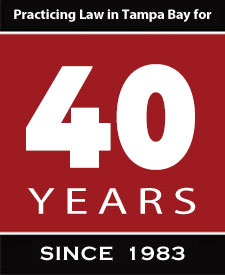A lawyer is bound by Bar ethics rules when he is a party in a case the same as if he is acting as an attorney, according to the Florida Supreme Court.
The court on July 19 upheld a referee’s finding that an attorney violated several rules by his actions related to his divorce and child support case, but increased the referee’s recommended punishment from a 12-month suspension to an 18-month suspension.
As part of a divorce decree issued in 2010, the attorney was ordered either to refinance the marital home, remove his ex-wife’s name from the property (he had moved out), or sell the home. Just before the house sale was to close and the ex-wife had vacated, the husband moved back in and the sale fell through.
The husband was unable to refinance the house, and in an attempt to obtain a mortgage modification, a notary friend signed the ex-wife’s name, in front of the lawyer and without her permission, to the application and notarized it. The ex-wife was unaware of the action until the attorney failed to make payments under the modified action and she was served as part of a foreclosure filing.
The ex-wife filed for contempt since her name had not been removed from the house title as ordered. The court ultimately withheld a contempt finding, but ordered the attorney to pay $2,500 in attorneys’ fees to his ex-wife.
In 2013, the attorney was served with discovery requests over failure to pay child support, but the attorney failed to respond for the next year and also failed to appear in court when ordered by the judge. The attorney was eventually sanctioned and ordered to pay the ex-wife’s attorneys’ fees, and remained in violation of several family court orders throughout the disciplinary case.
The referee and court rejected the attorney’s claim he missed some court appearances because he was representing clients, noting he made no attempt to inform the court of any conflicts. The referee also found the attorney was deceptive in the disciplinary process.
“His conduct was entirely unbecoming of a lawyer, who is held within a position of trust and respect in our society, and cannot be tolerated,” the court said in its opinion. “Although [the attorney] committed this misconduct as a party to his own divorce, lawyers ‘do not cast aside the oath they take as an attorney or their professional responsibilities’ just because they are litigants in personal matters. Fla. Bar v. Cibula, 725 So. 2d 360, 365 (Fla. 1998).”1
1 This blog was taken from the Florida Bar News, October 1, 2018, retrieved from: https://www.floridabar.org/news/tfb-news/?durl=/DIVCOM/JN/jnnews01.nsf/Articles/B25A9D07B226FF818525830F00501375


